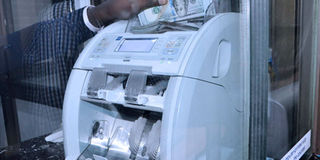Bank of Uganda injects $200m to shield shilling

Slow down the pace: The Central Bank has been intervening in the money markets as it seeks to slow down the pace at which the shilling is depreciating. FILE PHOTO
What you need to know:
- Shielding the shilling. The Central Bank, according to people familiar with the money markets, has at least intervened on three occasions as it seeks to shield the shilling from rapid depreciation.
- Mr Peter Ocheing, an expert in the retail fuel business with market experience in Uganda, Kenya and Rwanda yesterday said: “Because of the international price of a barrel, which is falling, prices of fuel will remain stable at least for some weeks to come.”
The Central Bank has in less than a fortnight injected about $200m (Shs780b) as it seeks to shield the shilling from depreciation.
The shilling has for about two weeks experienced a lot of volatility mainly because of speculation and panic buying resulting from the Covid-19 distress.
The unit, which had been largely stable for over a year, started moving northwards from a range bound of Shs3,700 against the dollar.
The intervention, according to people familiar with the market, could have starved of the rapid depreciation that has seen the unit sell at between Shs3,920 and Shs3,940 by close of yesterday.
Mr Stephen Kaboyo, an expert in forex and the managing partner of Alpha Capital, yesterday told Daily Monitor that he estimates the Central Bank to have intervened with close to $200m in a bid to fend off the speculative attack on the shilling.
Daily Monitor could not readily verify the figure as email inquiries to a number of Bank of Uganda officials were not responded to.
However, in an earlier statement, Mr Emmanuel Tumusiime Mutebile, the Bank of Uganda governor, said they would intervene in the market as and when it is necessary.
Mr Kaboyo also noted that earlier interventions could have delayed to stabilise the shilling given that the unit had experienced a lot of volatility in the first week of March.
By yesterday, the unit had firmed at Shs3,920/Shs3,940 but experts have warned it might depreciate further.
In the statement, Mr Mutebile expressed concern over the turn of events, noting that the evolving situation was still difficult to predict the extent and severity of the impact of COVID pandemic on the economy.
However, he directed that all supervised financial institutions must continue to operate effectively through putting in place contingency plans that would guarantee the safety of customers and staff.
He also noted that the Central Bank would intervene in the foreign exchange market to smoothen out excess volatility arising from the global financial markets.
Fuel prices remain stable
Meanwhile, pump prices across the country have remained stable in the face of depreciation of the shilling which usually influences their movements on the local market.
Over time, local fuel prices have traditionally not responded to movements in the global oil market but only registered movements in response to the performance of the shilling against the dollar.
However, with all that is happening across the globe one would expect the price of fuel to increase in accordance with market volatilities.
A mini survey conducted by Daily Monitor yesterday indicated that fuel prices had remained stable with pump prices going for an average of Shs4,050 for petrol while diesel was selling at an average of Shs3,920 per litre by yesterday.
Mr Peter Ocheing, an expert in the retail fuel business with market experience in Uganda, Kenya and Rwanda yesterday said: “Because of the international price of a barrel, which is falling, prices of fuel will remain stable at least for some weeks to come.”
International oil prices have been volatile since February with a barrel dropping from $50 down to $10 with consumption and demand depressed due to lockdown across a number of countries.




